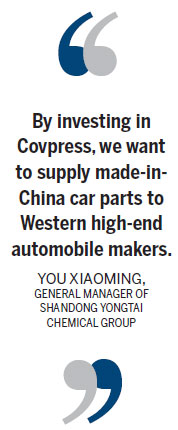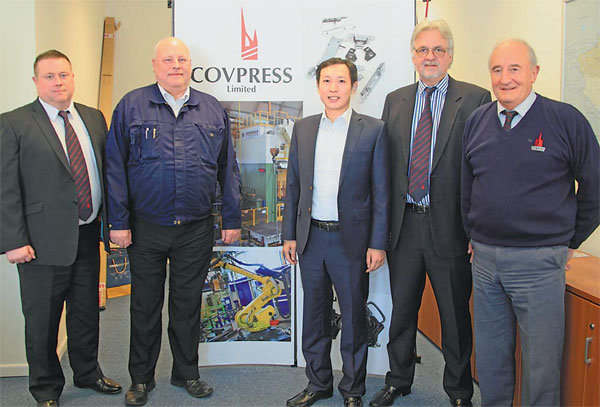UK stalwart boosted by Chinese tie-in
Updated: 2015-06-26 06:40
By Meng Jing(China Daily Europe)
|
|||||||||||
One of West Midlands' oldest industrial firms keeps growing thanks to yongtai partnership
Chris Challen, who does heavy lifting for a car-parts maker in central England, may seem like an unlikely candidate to be picked by his company for a business trip to China.
The 38-year-old crane operator at the Coventry-based Covpress International Holdings is likely to visit the country soon to pass along his knowledge from 17 years of work experience to workers at Covpress' factory in Yingkou, East China's Shandong province.
|
You Xiaoming (center), general manger of Shandong Yongtai Chemical Group, and employees with Covpress International Holdings. Jiang Shan / China Daily |
About two years ago, Shandong Yongtai Chemical Group, a leading private tire producer in China, bought a 70-percent stake in Covpress, a West Midlands pressed materials company with a history of more than 120 years that makes products such as pressed steel car-body parts. The deal was worth 30 million pounds ($46.6 million; 41.6 million euros), with Telford-based TIA Treadsetters taking a minority stake, the Birmingham Post reported.
But the story of Challen's company is unlike the typical business story of British companies relocating their manufacturing base to China. Covpress' story is more about how Chinese investment helped a UK company get a firmer foothold on the globalized stage.
With the capital injection from Yongtai, Covpress has moved to a development fast track. On June 12, Yongtai made a 28 million pound acquisition of another British automotive manufacturer, UYT, which will serve as a car-parts assembly subsidiary for Covpress.
"The new acquisition is important for Covpress to extend its industrial chain and be more competitive in the global car-parts market," says You Xiaoming, general manger of Yongtai, who is charge of the overall development strategy at Covpress.
According to You, Yongtai has added more machines and more experienced engineers at Covpress since the investment in 2013. Since then, the production capacity of Covpress has jumped 30 percent, and the number of employees increased from 400 to 700. It has gotten increasing orders from automakers such as Jaguar Land Rover, the Coventry-based multinational automotive company.
"Covpress has gained more orders than they can actually produce. We have had to eliminate some office space to make room for production," says You, who travels frequently between Dongying city in Shandong and Coventry, a UK motor and cycle manufacturing with a history dating back to 1896.
Many vehicle-related factories in Coventry went bust, but Yongtai has given Covpress new life, especially after its business hit bottom during the global financial crisis.
Challen says workers have never been busier. "In the hard times before the acquisition, our workers could work only three or four days a week because we didn't have enough orders. Now we work five days a week, and every day we have three shifts. But still we sometimes need to work extra hours on weekends."
Covpress' sales jumped from 67 million pounds in 2012 to about 80 million pounds last year. You says the company's goal is annual sales of 90 million pounds by 2016. "We could even reach the goal ahead of schedule," he says.
However, success for Covpress' UK business is only one part of Yongtai's plans. "By investing in Covpress, we want to supply made-in-China car parts to Western high-end automobile makers," says You.

Covpress' new China factory, where production capacity is about eight times that of the Coventry plant, was put into operation in June. The factory, in Yingkou, is seen as a new engine not only to drive Covpress to become a global supplier, but also for Yongtai to get its fingers into the high-end automobile business.
"It is very difficult and time-consuming for China-made components to get onto the procurement lists of high-end carmakers. But since Covpress is already a supplier for Jaguar Land Rover, it is not difficult for our China factory to get in, as long as we can make sure that the management and the quality of our products at Covpress' China factory is at the same level as its sister factory in Coventry," says You.
He adds that Covpress' technology, its experience in pressing, and its connections and networks in the industry are the main reasons Yongtai invested in the company.
You says Covpress' reputation earned its China factory its first order from JLR in May. "The order is from JLR Europe. But with more Western carmakers producing locally for the Chinese market, we can tap into the high-end car-parts industry in China in the near future," he says.
You has a vision that with further development, China may overtake Europe to become the center of the world's automobile industry. "Building a China factory into a tier-one car-parts supplier is critical for our future growth," he says.
The automotive market in China has been the largest in the world since 2008. Statistics from China's Ministry of Industry and Information Technology showed that 23.72 million automobiles were produced and 23.49 million automobiles sold in China in 2014. The figures represent year-on-year growth rates of 7.3 percent and 6.9 percent, respectively.
Lord Mike Whitby, who is international affairs adviser to Covpress, has said that some people initially had doubts about Chinese investment in the United Kingdom. "People accused the Chinese of lifting and shifting, but that has not proved to be the case. In Covpress' case, they have already driven up sales exponentially with a view to becoming a global supplier," says Whitby.
"A joint venture with China can open up a market of 1.3 billion immediately. This is a win-win situation for Covpress. Looking at the future in Coventry, they (Chinese investors) could be envisaging creating hundreds of new jobs."
For You, the biggest challenge ahead is how to make full use of the production capacity of the two Covpress factories rather than having to battle it out to secure orders.
To improve production efficiency at Covpress' China factory, many British engineers have been invited to China to solve problems and train Chinese workers. A monthly exchange program between Chinese workers and British workers has also been set up.
As a member of the exchange program, Challen is thinking of learning some basic Chinese to prepare for his trip. "The tools they use in the China factory are replicated from our factory in Coventry. So we can actually help them out with the quality," he says.
Cecily Liu contributed to this story.
mengjing@chinadaily.com.cn
(China Daily European Weekly 06/26/2015 page19)
Today's Top News
EU, China must turn words into deeds
Greek doors are open to investment
Gunmen kill 27 in attack on Tunisian coastal resort
China opposes Dalai Lama UK appearances
Severed head found in French attack
France orders nationwide clampdown on Uber
No rest until sweeping victory against drugs, Xi says
High-tech seen as promising investment target
Hot Topics
Lunar probe , China growth forecasts, Emission rules get tougher, China seen through 'colored lens', International board,
Editor's Picks

|

|

|

|

|

|







